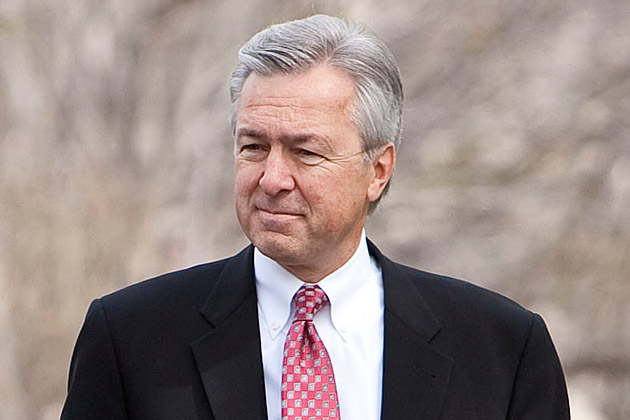John Stumpf, chief executive of Wells Fargo, stands to collect $123.6 million in walkaway money if he retires from the bank, according to a report on Monday.
After a poorly received performance before the Senate Banking Committee last week, Stumpf is under pressure to better handle questions Thursday from members of the House Financial Services Committee. Some Senators have called on Stumpf to resign after the bank agreed to pay $185 million in fines to settle claims the bank’s employees opened unauthorized accounts to meet sales goals.
House Republicans are poised to pounce on Stumpf, as they seize on an opportunity to discredit the Consumer Financial Protection Bureau, one of the regulators that fined Wells, industry analyst Jaret Seiberg wrote in a report Monday. Republicans have widely criticized the agency since its creation in the 2010 Dodd-Frank financial overhaul law as having vast powers but no accountability.
“One should not expect Stumpf to get an easier reception in the House than he received in the Senate last week,” the report says. It notes that House Republicans want to show the bureau failed to identify problems before Los Angeles’ city attorney brought them to light.
“If anything, the questioning could be more direct and less respectful,” Seiberg wrote. “Republicans have an incentive to discover more troubles.”
In an interview on CNBC, FBR analyst Paul Miller said investors and regulators are looking for a change in leadership at the bank. Stumpf has not indicated plans to resign.
“As long as Stumpf is there, it’s hard to turn that page at this point,” Miller said.
In a statement Monday, Wells Fargo said it welcomes “the opportunity to provide the committee with information on this matter and to discuss steps we have taken to affirm our commitment to customers.”
The bank, whose largest employment hub is in Charlotte, declined to comment further.
Stumpf is expected to face off Thursday against the full House committee, whose members include Maxine Waters, a Democrat who represents Los Angeles. That city sued the bank last year over claims its high-pressure sales culture drove employees to open unauthorized accounts.
In a statement this month, Waters has urged the U.S. Department of Justice “to pursue criminal cases wherever warranted” in connection with the Wells Fargo revelations. She said the findings “demand a further investigation into how such a widespread scheme could proliferate unnoticed by management.”
Stumpf is appearing before the House committee amid a heated presidential election in which both candidates have criticized Wall Street for its role in the financial crisis. House members are all up for election this year.
Last week’s nearly three-hour hearing included a memorable exchange involving Massachusetts Democrat Elizabeth Warren, who accused Stumpf of “gutless leadership“ and called for him to resign and be criminally investigated.
During the hearing, lawmakers also hammered Stumpf on whether the bank will recover compensation from top executives, a decision the CEO said is up to the bank’s board, not him.
Since the hearing, an investor group has called on the bank to replace two directors, and the bank has reportedly hired a law firm advising it on whether it should claw back pay from Stumpf and some other executives.
The bank is also facing other legal troubles, including an investigation by U.S. Attorneys Offices in Charlotte and San Francisco and a California lawsuit seeking class-action status over how employees were treated.
Christopher B. Taub













